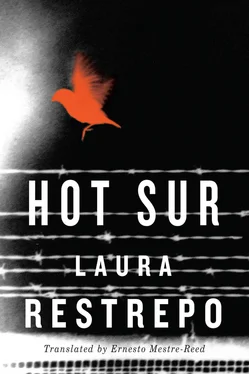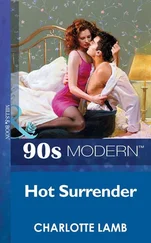“What woman, sir?” she responded dryly as she walked toward the kitchen, her sandals snapping loudly.
On the day the package arrived, Rose spent the rest of the day out of the house doing errands, but he had not stopped thinking about the package he’d left unopened on his son’s bed. When he returned, he had the urge to go up and examine it, but some scruple about meddling in his son’s private matters stopped him. If there was something his son detested it was for anyone to invade his space, so Rose resisted the urge to open the package and went into the kitchen to make a sandwich. But immediately he was hounded by a completely opposite sensation. Would he not be betraying his son by ignoring such a sign? As he downed his sandwich with a glass of lactose-free milk by the fireplace, he began to think that it would not be so absurd or disrespectful to open the package, which perhaps would be the last sign Cleve sent.
“Alright, Cleve,” he said aloud, “just let me finish eating this and we’ll open it, see what this is about. You want me to do it, right? You’re giving me permission to open your private correspondence? Of course you do; at this point why would you care?”
The package contained 140 pages of rose-colored stationery of the kind that adolescent girls used for letters. The manuscript was handwritten, in what Rose was fairly certain was feminine script. The pages had writing on both sides, tighter as it went on, as if the author had calculated that she might run out of paper.
“Well, Cleve,” Rose said, “it seems as if a girl has sent you a very long love letter.”
The person who had written it wasn’t the one on the return address, a Mrs. Socorro Arias de Salmon, from Staten Island, but a young woman who wanted to remain anonymous and who declared that she’d use the pseudonym María Paz. This María Paz wrote in the first person to confess something to Cleve, referring to him as Mr. Rose. The following dawn, Ian Rose was still awake reading the one hundred forty rose-colored pages in the attic, sitting up on Cleve’s bed under the blanket, still dressed, the two big dogs lying on the floor, and the small one, Skunko, beside him.
“It’s his thing, that dog,” Ian Rose tells me, “I don’t allow him to go up on my bed, always been very strict about that, but not Cleve. And now without Cleve, his bed has basically become Skunko’s bed, so I didn’t tell him to get down. After all, if there was an intruder, it was me.”
Whoever the real author was, she had placed all her hopes on Cleve, had entrusted him with the story of her life. Rose asks me if I agree, because maybe these are just his own speculations, he doesn’t know much about these things, but he can’t get out of his head the feeling that the story of a life is that life, precisely that life, which in the long run can only exist to the extent that there is someone who tells its tale and someone who listens to it.
“Alexander the Great, who brought historians along to all his missions and battles, knew this well: what is not narrated might as well not have occurred,” Rose tells me, adding that the fact that he is an engineer doesn’t mean that he doesn’t like to read. “I’d say that the recipient of a testimony of a life becomes a kind of conscience before which the other unravels his deeds so that he may be condemned or acquitted. Or at least that’s what happens to me when I read a novel or an autobiography, fiction or something based on fact. A strange thing happened as I was reading it. I felt as if the life of that young woman, María Paz, was literally in my hands. She had chosen my son, Cleve, for that task, or I should say Mr. Rose. And it so happens that I too am a Mr. Rose, and as I read the manuscript I fell under the impression that this woman was also addressing me, and that by telling me her troubles, she was putting herself in my hands, because of the two Mr. Roses, I was the only one still alive. It should have been the other way around, me dead in the accident, while my son lived out what was left of his life. But that’s not how it happened. And at that moment, I was the only Mr. Rose who could read what that woman had written, revealing to me things not only about herself, but also about her son.”
Parts of the manuscript were written in blue ink, parts in black ink, and sometimes in pencil. The parts that looked most scrawled had been written in the dark, as she herself recounted, or after nine in the evening, lights out in the prison. This had happened to Rose before, while he still lived with Edith, when in the middle of the night, he thought of something he had to add to a report he had been writing, some technical thing for the office, and so as not to wake her by turning on the light, he wrote a couple of paragraphs in bed, in the dark. The following morning he found a bunch of gibberish similar to what María Paz had written, scribbles and scratches climbing one upon another.
The young woman expressed herself in an English splattered with Spanish, and Rose tried reading two paragraphs aloud to hear how it would sound. It was good, natural and good. The two languages blended together in a playful manner, like two young lovers with little experience in bed. Rose didn’t have any trouble with the Spanish, which he had learned to speak in Colombia, although not very well. Edith had learned almost none, her displeasure with Colombia fueling her unwillingness to learn the language. Cleve had learned it perfectly, the way children do, without being forced or making an effort.
From Cleve’s Notebook
For my mother, our stay in Colombia was marked by recurrent nightmares from which she’d awaken screaming things, and which persisted even after we had left. Things like the guerrillas were going to kidnap us, thieves were stealing the rearview mirrors from our cars, the volcanoes in the Andes were spitting rivers of lava, I had swallowed some red, poisonous seeds and they had to rush me to the hospital.
I, on other hand, have felt a sense of nostalgia ever since we left, but I’m not exactly sure for what. I miss some indefinable thing, maybe that powerful damp smell of the color green that had stirred the senses of that repressed child I’d been, or the streams of adrenaline that shot through me when I’d witnessed a machete fight between two men, or the dangers of the mountain roads: trucks that sped suicidally through tight curves above an abyss of fog, and the fruit stands clinging by their nails to the roadside, so that travelers could buy the fruit from their cars, although that last memory is more my father’s than mine, that one about the exotic fruits, because I actually never wanted to taste any of them, and have to admit that since that time, to this very day, I’m still afraid to put strange foods in my mouth. Yet I remember the names of those fruits, names with a lot of a ’s and y ’s, and I pronounce them all in a row, one time and two as if it were a spell: cherimoya, cherimoya, papaya, papaya, maracuya . Memories. In Spanish, recuerdos, re-cordar , from the Latin, cor, cordis , the heart, that is, a return to the heart, so that memories of childhood would have to be pulled from the heart in which they’re kept.
I’m convinced that certain childhood memories can begin to take over, ensconcing themselves in the niches of the mind like ancient saints in a dim church, and from there they emit a strange light, something mythical that little by little begins to take precedence over other matters until they become our primary and perhaps only religion. I think that deep within me many of those fruits glimmer with such a light, and I regret never having had the gall to sink my teeth into them, because perhaps it would have been for me like Communion for Christians, who consume God with each wafer. The names of those fruits were fascinating and difficult to pronounce, and of course all myths arise from what cannot be known, what we perceive as mysterious and fills us with panic and marvel. It’s not that today I secretly pray to a god called Guanabana or that I offer sacrifices to Cherimoya, not something as ridiculous as that, but that I refuse to end up as a simple Westerner and reject the more prodigious fruits for a diet of oranges and apples.
Читать дальше












